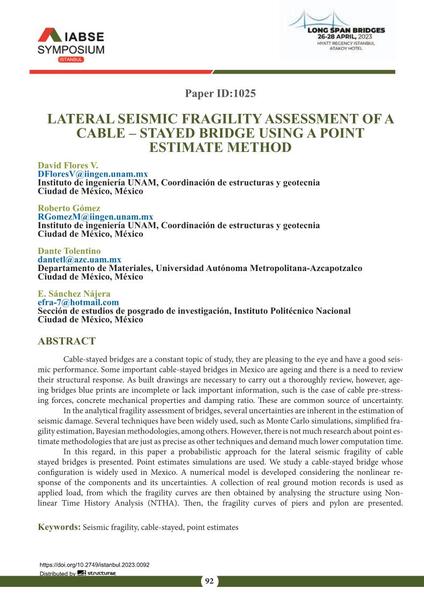Lateral Seismic Fragility of a Cable-Stayed Bridge using Point Estimate Method

|
|
|||||||||||
Bibliographic Details
| Author(s): |
David Flores V.
(Instituto de ingeniería UNAM, Coordinación de estructuras y geotecnia Ciudad de México, México)
Roberto Gomez (Instituto de ingeniería UNAM, Coordinación de estructuras y geotecnia Ciudad de México, México) Dante Tolentino (Departamento de Materiales, Universidad Autónoma Metropolitana-Azcapotzalco Ciudad de México, México) E. Sánchez Nájera (Sección de estudios de posgrado de investigación, Instituto Politécnico Nacional Ciudad de México, México) |
||||
|---|---|---|---|---|---|
| Medium: | conference paper | ||||
| Language(s): | English | ||||
| Conference: | IABSE Symposium: Long Span Bridges, Istanbul, Turkey, 26-28 April 2023 | ||||
| Published in: | IABSE Symposium Istanbul 2023 | ||||
|
|||||
| Page(s): | 92-100 | ||||
| Total no. of pages: | 9 | ||||
| Year: | 2023 | ||||
| DOI: | 10.2749/istanbul.2023.0092 | ||||
| Abstract: |
Cable-stayed bridges are a constant topic of study, they are pleasing to the eye and have a good seismic performance. Some important cable-stayed bridges in Mexico are ageing and there is a need to review their structural response. As built drawings are necessary to carry out a thoroughly review, however, ageing bridges blue prints are incomplete or lack important information, such is the case of cable pre-stressing forces, concrete mechanical properties and damping ratio. These are common source of uncertainty. In the analytical fragility assessment of bridges, several uncertainties are inherent in the estimation of seismic damage. Several techniques have been widely used, such as Monte Carlo simulations, simplified fragility estimation, Bayesian methodologies, among others. However, there is not much research about point estimate methodologies that are just as precise as other techniques and demand much lower computation time. In this regard, in this paper a probabilistic approach for the lateral seismic fragility of cable stayed bridges is presented. Point estimates simulations are used. We study a cable-stayed bridge whose configuration is widely used in Mexico. A numerical model is developed considering the nonlinear response of the components and its uncertainties. A collection of real ground motion records is used as applied load, from which the fragility curves are then obtained by analysing the structure using Non-linear Time History Analysis (NTHA). Then, the fragility curves of piers and pylon are presented. |
||||
| Keywords: |
cable-stayed seismic fragility point estimates
|
||||
